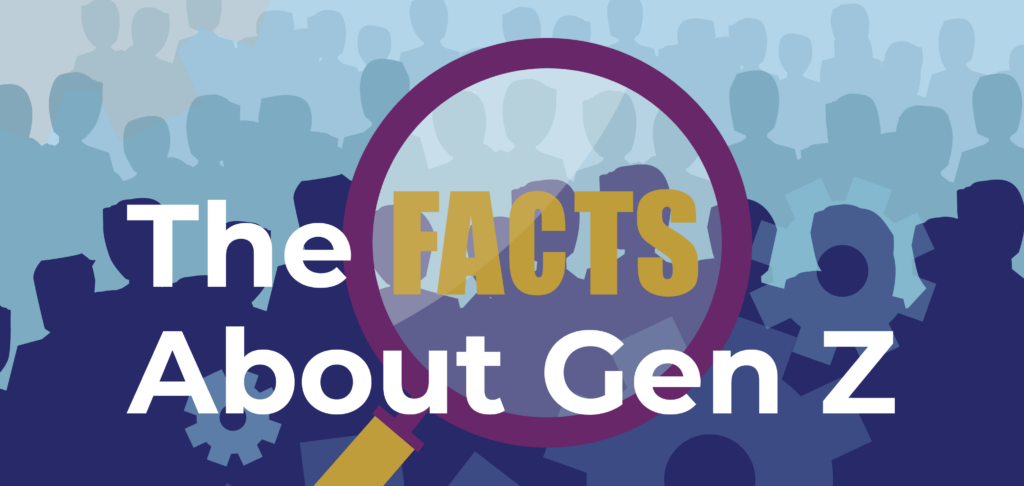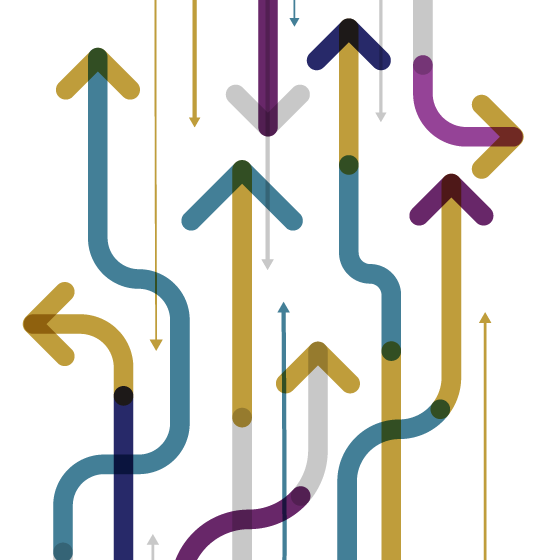We’re halfway through the 10th annual Insurance Careers Month – an industry-wide initiative focused on encouraging the next generation of talent to choose a career in insurance. Along with building a bench of talent as seasoned professionals reach retirement, there are a number of benefits to welcoming young professionals and new graduates with open arms. However, similar to when their predecessors – the Millennials – entered the workforce, members of Generation Z (those born between 1997 and 2012) are often quickly labeled, stereotyped and misunderstood.

Whether you are currently leading a cross-generational team or simply seeking to better understand your younger colleagues, being open-minded and seeking to learn more about this group is invaluable. Below we separate fact from fiction to provide a clearer understanding of the youngest generation in the workforce.
Fiction: Gen Z is all the same.

Fact: Gen Z is the most diverse generation yet, with a wide range of perspectives and experiences.
The most common misconception about Generation Z (or any generation) is that all its members possess the same attitudes and behaviors. Just like the generations before them, members of Gen Z are not all going to fit into one box or category. In fact, a little less than two years ago, Pew Research shared it’s no longer approaching its research through a generational lens in large part due to these labels often resulting in oversimplification or further fueling stereotypes. Life stage plays a significant role in how all individuals operate. As people of all generations gain experience and encounter major life events, their priorities, behaviors and perspectives naturally evolve, as well.

Fiction: Gen Z is dependent on technology.
Fact: While they are digital natives, many Gen Zers prefer face-to-face communication.
As the first generation to never know a world without smartphones, tablets and apps, Gen Zers are digital natives. However, this doesn’t mean they don’t appreciate in-person conversations and other more traditional methods of communication. While text and instant messaging has become the norm across most generations, 51% of Gen Zers shared they prefer face-to-face conversations, according to a Johns Hopkins report.
Fiction: Gen Z can’t learn soft skills.
Fact: Soft skills can be developed, and many organizations are investing in related programs.

One shared experience of the Gen Z workforce is going to school and/or starting their careers fully remotely during COVID. As a result, there’s been less opportunity to practice and grow interpersonal skills in a professional setting. About half of executives say they don’t think Gen Z is ready for the workforce due to a lack of soft skills. Fortunately, these skills can be taught and some organizations have begun investing in programming around soft skills to help balance and amplify the hard skills this generation brings to the table.

Fiction: Members of Gen Z aren’t loyal.
Fact: Gen Z values stability, but won’t stay in a role that lacks growth, balance or purpose.
It’s important to note that job hopping isn’t a trait specific to Gen Z or Millennials. The days of beginning and ending a career with one employer are largely over, regardless of an individual’s generation. Following the pandemic, the industry experienced a rise in voluntary quits as individuals reevaluated what they desired in their careers. Similarly, Generation Z won’t settle for an employer that doesn’t meet their criteria surrounding flexibility, work-life balance, career development and shared values. Almost half of Gen Z individuals would rather be unemployed than stuck in a job they don’t like. However, Gen Z also considers job stability one of the most important factors when making career decisions.
Fiction: Gen Z is driven only by money.

Fact: Career development and learning opportunities are even more important to Gen Z.
While compensation is important across all generations, Gen Z places highest value on career development. Sixty-three percent of undergrads say learning and development opportunities are either important or essential when evaluating a potential job. This also impacts their decision to remain with a company or seek new opportunities as they build the foundation for their longer-term careers.

Fiction: Gen Z is lazy.
Fact: Gen Z prioritizes well-being and sustainable work habits, redefining work-life balance.
Today’s concept of work-life balance is much different than it was even five years ago. Gen Z is entering the workforce following half a decade of flexible work schedules and remote work. Their focus on upholding boundaries and prioritizing wellness and mental health contrasts with many of the tendencies of their predecessors. This generation has influenced terms like “quiet quitting” and “lazy girl jobs;” however, this is often more a reflection on employers and their ability (or inability) to prevent burnout while engaging and connecting with their employees.
There’s no doubt Generation Z has a lot to offer our industry, especially amid pending retirements. By keeping an open mind, getting to know these individuals and valuing what they bring to the table, there’s much to be learned from the youngest members of the workforce.